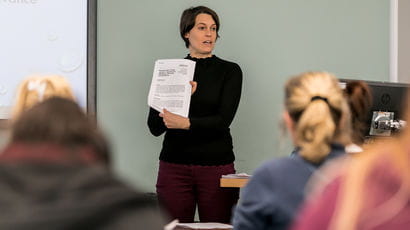Research governance
Research governance for postgraduate researcher degrees includes research project conduct, ethics, research data management, intellectual property and misconduct.
Overview
Research governance is the framework by which the University manages research to ensure research integrity is maintained. This framework includes principles, legal and regulatory provisions, standards of good practice, policies, guidance, systems, management and supervision. Further information about UWE Bristol's framework for research governance is set out in the University’s Code of Good Research Conduct.
Regulations
The relevant regulations are E10.
Regulations can be viewed in full in the Academic regulations 2025/26 (PDF).
Procedures about research governance
Research project conduct
- All UWE Bristol research must have a designated project manager who is responsible for the conduct of the research including compliance with the University’s Code of Good Research Conduct and University policies including but not limited to:
- Health and safety and risk management.
- Research ethics.
- Research governance and research data management.
- Intellectual property.
- IT acceptable use.
- Staff welfare and dignity at work.
- For postgraduate research projects at UWE Bristol, the designated project manager is a UWE Bristol member of staff, normally the DoS, who is responsible for ensuring that the project is carried out in line with the University’s Code of Good Research Conduct, and meets the University’s requirements for research governance, research data management, intellectual property management, and timely ethical approval where appropriate.
- The DoS (project manager) is responsible for ensuring that the Postgraduate Researcher (PGR) submits any necessary application for ethical approval for the project where appropriate. Non-compliance with the University’s ethics requirements may lead to an investigation under research misconduct procedures.
- The research project confirmation process (Regulation E9) is undertaken by the PGR with guidance from the DoS. As part of this process the DoS will be required to confirm that they have provided advice to the PGR about the key requirements for good research governance and research data management, including research ethics and intellectual property, and confirm that the project as proposed by the PGR complies with these. PGRs will also be required to confirm that they have discussed these matters with their DoS.
- In addition, PGRs must comply with any mandatory training about research integrity, ethics, and research data management that is provided for them by the University. They are also strongly recommended to attend relevant researcher skills workshops within the ‘Invest in Yourself’ programme provided by the Doctoral Academy. Additional support and resources are also available for PGRs via the UWE Bristol Library.
- At each stage of progression (progression examination and progress review stages 2 and 3) reviewers will check with the PGR that the research governance arrangements continue to be appropriate for the project, and compliant with University requirements for research data management and ethical approval.
- A postgraduate researcher who, having received appropriate advice and guidance from their DoS/supervisory team, deliberately and wilfully chooses to ignore it resulting in a breach of the requirements of the Code of Good Research Conduct, may be personally liable (see Code Chapter 5, 5.3.1, page 1).
Research ethics
- All research involving animals, or human participants, their tissues or data, requires ethical approval by the University's Ethics and Integrity Committees (UEIC) or the Animal Welfare and Ethics Sub Committee (AWESC) or one of its College Research Ethics Committees (CRECs). Please check the applying for ethical approval webpage for the most current processes.
- All PGRs must complete a short online training module in research ethics as part of the project confirmation process. The link to the training module is embedded in the CP1 – PGR confirmation of project form (DOC).
Intellectual property
- The DoS is responsible for providing guidance on the application of the University’s policy on Intellectual Property (IP) both in regard to the PGR’s own research study and outputs, and to the use of any third-party IP within their thesis. This discussion should include consideration of how any IP arising from the project is to be dealt with and whether an IP assignment is appropriate. Guidance about intellectual property and research (PDF) is available (section 2b is specific to PGRs) and the DoS should contact the UWE Bristol Intellectual Property team for additional advice where necessary.
- Decisions about whether an IP assignment is taken will normally require approval by the Head of School or equivalent.
- Where the research project involves collaboration with other external bodies or organisations, or individuals employed by those organisations, any related IP agreements or assignments in place should be noted at project confirmation stage.
- Where there is a change in the project or supervision arrangements or the introduction of collaborative partners at any point subsequent to project confirmation stage, it is the DoS' responsibility to ensure that the project remains compliant with the requirements of any existing IP agreements, and seek advice from the UWE Bristol Intellectual Property team about changes or new assignments where necessary.
Third party copyright
- PGRs should be careful to copy extracts of published works (including diagrams and illustrations) within permitted limits, ensuring that they obtain any necessary permission and attribute these appropriately in their thesis/critical commentary. All third party material is subject to copyright rules unless there is an explicit statement to the contrary. Copyright approval must be obtained regardless of whether a thesis/critical commentary is in electronic or printed format.
- Obtaining third party copyright permissions can be time consuming. PGRs are advised not to leave this to the last minute and should use the copyright guidance provided by UWE Bristol Library, which covers copyrighted material in your thesis and investigating requirements during drafting rather than just before submission of the thesis. It is likely that permission from the copyright holder will be required before the thesis can be published on the UWE Bristol Research Repository and it may delay the award of the degree if not obtained.
Research data management plan
- The process of developing a research data management plan begins at the start of the research project and is revisited through the stages of research. It outlines how all research data will be generated or collected, managed, stored and preserved, shared or disposed of, and takes account of any access restrictions that are required, for example to protect research participants, for ethical concerns, or reasons of commercial sensitivity. This is part of good research governance.
- All researchers at UWE Bristol, including doctoral researchers via their DoS/project manager, must develop a research data management plan before collecting any data as part of research, or using any data for research. The data management plan may require the deposition of data in a research repository. This may be a repository identified by the UK Research and Innovation (UKRI) or other research organisation, a funder or collaborator, or otherwise the UWE Bristol research data repository.
- The designated UWE Bristol project manager, who is normally the DoS, is responsible for working with the PGR during their research studies to develop and maintain the research data management plan, ensuring that research data will be appropriately, and where necessary sensitively, dealt with.
- All PGRs must complete a short online training module about research data management as part of the project confirmation (CP1) process. The link to the training module is embedded in the CP1 – PGR confirmation of project form (DOC).
- The UWE Bristol Library provides online guidance about how to set up a research data management plan and what should be included in it. There is also a UWE Bristol research data management plan template available.
- Where a PGR publishes research during their doctoral registration (for example, journal papers or other research outputs entering the public domain) the DoS should ensure that the associated research data is stored and/deposited in accordance with the research data management plan by depositing it on the UWE Bristol research data repository, or as agreed with external collaborators or funders. PGRs should also ensure that the complete core research data relating to their thesis is deposited upon submission and prior to graduating on the same basis.
Open access to research and restricting access to a thesis or core research data
- In the interests of supporting open access to research, the University does not normally restrict access to a thesis deposited on its research repository and will normally restrict access to core data underpinning that thesis for a maximum of two years. The University may also shorten or waive any normal restriction on access to core data entirely where this is appropriate.
- The University recognises however, that there may be instances where it would not be appropriate to share research data or, for reasons of sensitivity, to add it to a data repository. Where the University has agreed to restrict access to the thesis this will normally be for a period of no more than two years from the date of the confirmation of the award. In exceptional cases the University may restrict access for a longer period or indefinitely where it is deemed necessary.
- Any application to restrict access to a thesis or to restrict access to the underpinning core data for longer than two years should be identified at Research Project Confirmation (see regulation E9), with appropriate supporting evidence. Applications will be considered by the designated CRDC, Examining Board or body. Where the need to restrict access to a thesis or to core research data emerges at a subsequent stage of registration, or changes are needed to the approved period of restriction, exceptional application must also be made to the designated CRDC, Examining Board or body.
- Applications will normally be approved only on the following grounds:
- to enable a patent to be lodged
- to protect commercially sensitive material
- to protect material that may be politically sensitive or has implications for national security
- to protect the safety, physical or mental health or wellbeing of identified individuals where research data cannot be fully anonymised
- where the candidate has not, despite ongoing and evidenced best efforts, been able to gain permission to include third party copyrighted material without detrimental effect to the fabric of the thesis
- where it can be clearly evidenced (for example, written confirmation from publishers) that the candidate's opportunities to publish material from the thesis in the normal range of journals or other published outlets for that subject discipline will be significantly and detrimentally affected by providing open access via the University's Research Repository, the British Library E-Theses Online Service (EThOS) or other specified online service.
- Where the designated Committee, Examining Board or body decides that the nature of the candidate's work prevents the thesis or its core underpinning data from being made openly available in the library of the University via the research repository or, in the case of a PhD, via the British Library EThOS or other specified online service, or in that of any collaborating establishment, then it will be retained by the University on restricted access immediately upon completion of the award for the time period approved. Subject to any requirements under the Freedom of Information Act (2002), it will only made available to those who were directly involved in the research during this time.
Procedures about academic misconduct and the investigation of assessment offences
Expectations
- Academic integrity is a fundamental principle of intellectual honesty to which all members of the academic community must adhere. Every student of the University is expected to act with integrity in relation to the production and representation of academic work, and in acknowledging the contributions of others in their work.
- Passing off another’s work as your own (plagiarism) is not only poor scholarship, it is unethical and can have serious consequences for your future career. It also undermines the standards of the University and the degrees it awards, and in the context of a research degree award it is an assessment offence, and may also be research misconduct.
- All allegations of assessment offences relating to research study undertaken by postgraduate researchers for the purpose of an MPhil or doctoral level award are considered to be serious and will be investigated accordingly.
Scope of the investigation procedures for PGR
This procedure links to regulation E10.
- The University has published combined processes for investigating assessment offence allegations in the Academic Conduct Policy and Misconduct Procedures (PDF). Detailed procedures for postgraduate researchers (PGRs) are included in this document.
- The process for PGRs is also summarised in a diagram in the procedures for investigating assessment offences in PGR degree awards (PDF).
- Allegations made against PGRs registered on an MPhil or doctoral level award (including those who are also members of university staff or affiliated staff) will be investigated as follows:
- Assessment offence allegations made against PGRs relating to the assessment of taught elements of the award for which UWE Bristol credit is awarded (for example, taught modules) will be investigated in accordance with part D10 of the University regulations and procedures relating to taught programmes within the policy.
- Assessment offence allegations made against PGRs relating to the assessment of the research project, the thesis, or the critical commentary (MPhil/DPhil by publication), or any other element of research undertaken directly relating to the award, will be investigated under regulations at both D10 of E10. The investigation will align with the principles of the University's Code of Good Research Conduct as appropriate.
- Allegations of research misconduct relating to any other area of research with which the postgraduate researcher is connected will be investigated under procedures set out in the Code of Good Research Conduct. In addition, the investigating College Director of PGR or PGR Assessment Offence Panel Chair may also refer an assessment offence case for consideration under the University’s research misconduct procedures (PDF) at any stage where there are clear grounds to do so.
Doctoral Academy Handbook sections

Introduction
Read an introduction to the UWE Bristol Doctoral Academy Handbook.

Research degree awards
The different postgraduate research awards available and the qualification descriptors they align to.

Student registration
The registration process and periods of active study for postgraduate research degrees.

Professional development and training requirements
Professional development and research training requirements for postgraduate researchers.

Supervision
The role and responsibilities of the supervisory team for postgraduate research.

Research project
The confirmation of the research project (CP1) is where arrangements for the start of the project are confirmed.

Research governance
Research governance for postgraduate research degrees, includes ethics, research data management, intellectual property, conduct and assessment offences.

Personal circumstances
Personal circumstances, reasonable adjustments and other support available to postgraduate researchers.

Progression examination: stage one
The progression examination viva and report submission.

Progress review: stages two and three
The progress review, options for evidence of progress and eligibility for the completion period.

Final submission
Requirements for preparing and formatting the final submission for Doctoral or MPhil level research awards.

Examiners
The University’s expectations of postgraduate research degree examiners and Independent Chairs.

Final examination
The final assessment for Doctoral or MPhil level awards by research.

Higher doctorates
The regulations and processes for eligibility, consideration, submission and awarding of higher doctorate awards.
